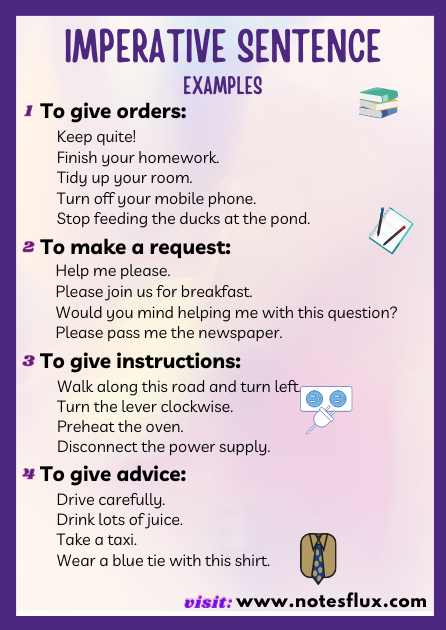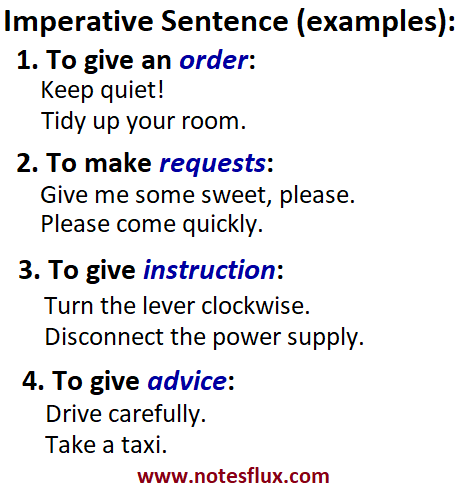Jump to:
- What are imperatice sentences?
- Structure of an imperative sentence
- 30 imperative sentence examples
- What is The Imperative Mood?
1. What are Imperative Sentences?
Imperative sentences tell others what to do or ask for something. Imperative sentences tell someone what to do or how to do something. They are used to express orders, instructions, or advice.
Imperative sentences often start with a verb and end with a period or exclamation mark. They are straightforward and direct, aiming to influence someone's actions or behavior.
Imperative sentences are used:
-
to give an order or a command
-
to make a request
-
to give instructions
-
to offer advice, a suggestion or an invitation
Watch a video introduction
Take a Grammar quiz:
1.2 Background:
Before we dive deeper and learn what imperative sentences are, and examin an imperative sentnces example, let's take a look at the broader classification of sentences in the English language.
In English, sentences can be of different types, and hence can be classified in different ways. One way to classify them is by their function.With this in mind, sentences can be classified as declarative, imperative, interrogative, and exclamatory sentences. In this article we focus on imperative sentences.


2. Structure of an imperative sentence
In an imperative sentence, the verb typically comes at the beginning, and the subject is altogether missing. More specifically, the subject is implied and often refers to the second-person, or "the reader".
An imperative sentence ends with a period (.) or an exclamation mark (!) depending on the forcefulness of the command. Also, imperative sentences can be in positive or negative form.
馃挕 Note:
One important feature of imperative sentences is their tone, which is often authoritative or commanding. However, the tone can vary depending on the context and the relationship between the speaker and the listener. It can be polite, firm, friendly, or even casual.
The following are some imperative sentence examples for each category:

Take a Grammar quiz:
3. Here are 30 imperative sentence examples:
To give an order:
-
Get out!
-
Keep quiet!
-
Do not stop!
-
Finish your work.
-
Tidy up your room.
-
Turn off your mobile.
-
See me after the class.
-
Don’t eat all the cake.
-
Stop feeding the ducks at the pond.
To make a request:
-
Give me some sweets, please. (a comma is used for emphasis)
-
Help me please.
-
Please come quickly.
-
Please cooperate with us.
-
Come out with us tonight.
-
Please join us for breakfast.
-
Give me a pen and a pencil.
To give instruction:
-
Walk along this road and turn left.
-
Turn the lever clockwise.
-
Disconnect the power supply.
-
Put them in the fridge for 10 minutes.
-
Preheat the oven.
-
Use olive oil in the pan.
-
Take a step and don’t move.
To give advice:
-
Drive carefully.
-
Drink lots of juice.
-
Take a taxi.
-
Review your answers before submitting.
-
Wear your green tie with that shirt.
-
Don't give her tea. (negative form)
4. What is The Imperative Mood?
Imperative sentences are the practical manifestation of the Imperative Mood in grammar. When we use imperative sentences, we are employing the Imperative Mood to convey commands, requests, or instructions.
馃挕 Note: The Imperative Mood encompasses the overall grammatical category, while imperative sentences are the specific sentence structures within that category.
By understanding the Imperative Mood, we can effectively construct and interpret imperative sentences to communicate our intentions assertively. The relationship between imperative sentences and the Imperative Mood highlights the importance of this grammatical aspect in conveying commands and requests in a concise and straightforward manner.
Imperative mood is a verb form that expresses a command, request, or an instruction. The subject of the verb is typically not mentioned.
The following are some examples:
-
Get out!
-
Keep quiet!
-
Don't eat that chocolate!
-
Go there.
-
Get ready.
-
Stop playing.
-
Stop shouting.
-
Stop eating.
-
Finish your work.
-
Close the window.
-
Let's go to the market.
Thanks for reading this article. We sincerely hope you enjoyed it.
If you noticed any mistake, or have suggestions for us, please let us know in the comments below. Thanks again.
Copyright © 2016-2024, www.notesflux.com
Please also take a look at some of our trending online practice tests:
- Practice subject-verb agreement
- Transitive and Intransitive verbs
- Identifying Gerunds and participles
- practice test on blend words
- A Level Organic Chemistry introduction
- A Level Organic Chemistry Halogenoalkanes
See Also:
English Grammar:
- 10 IELTS preparation tips
- Gerunds, participles and infinitives
- What are simile and metaphor?
- Clauses and their types
- Finite and non-finite verbs
- Transitive and intransitive verbs
- Direct and indirect objects
Physics:
- Changes in Energy Stores
- Work, Power and Efficiency
- Electric Current and Circuits
- Static Electricity



 Subject-Verb Agreement Quiz
Subject-Verb Agreement Quiz